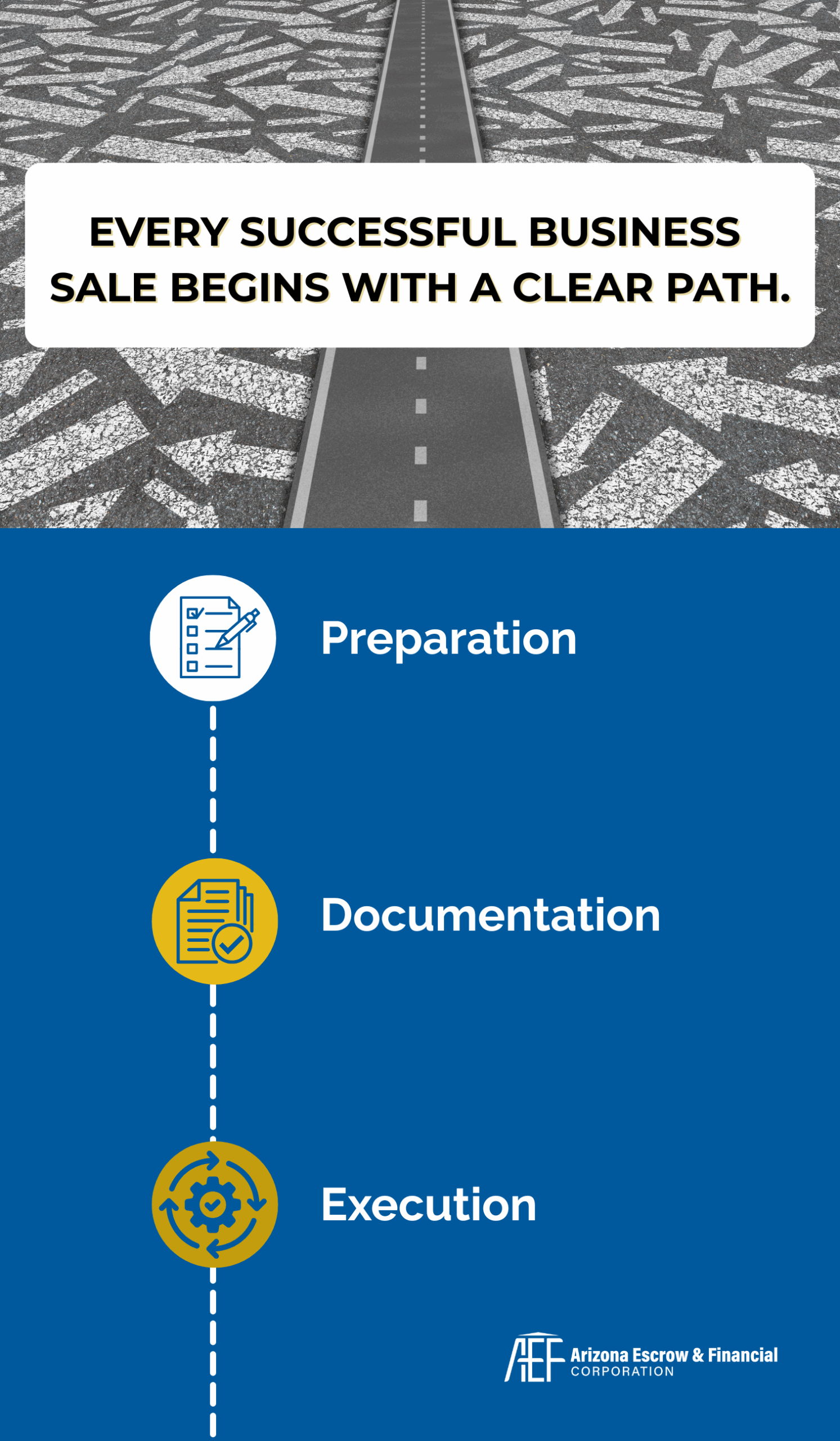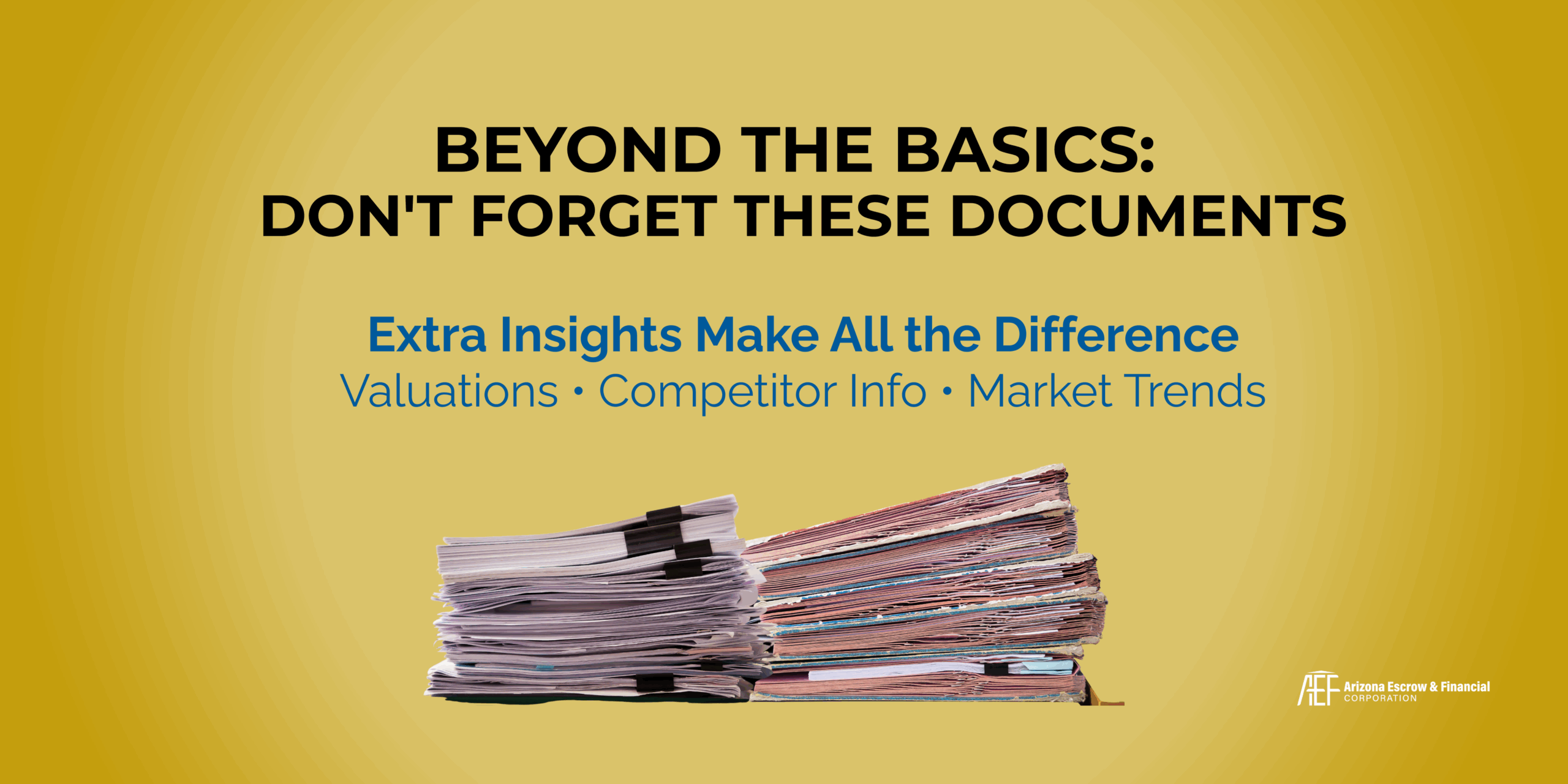
Selling a business is no small feat and it all starts with having the right information ready. To help business owners prepare, we reached out to Bradley Scott, an experienced Arizona-based business broker, commercial real estate expert, and licensed attorney, to craft this article as a guest author. Drawing on his legal background and years of experience guiding clients through transactions, he outlines the essential documents that can make or break a successful sale.
You are interested in selling your business. You worked your whole life to create this well-oiled machine that supported you and your family. You are yet to discuss a sale with anyone other than your spouse.
→ How do you begin?
→ What will your advisors require to properly advise your decision?
→ What will buyers and their advisors need to consider and complete a transaction?
It all boils down to preparing and knowing the best documents needed to sell a business.
Smooth and accurate business sales hinge on clean and organized company documents – from valuation to lending, due diligence to closing, this fact reigns supreme.
Selling a business is stressful enough. Do you want to be in the middle of a transaction, flustered, afraid of what your future holds, because you cannot demonstrate the accuracy of what you represented to the buyer? To avoid mishaps like this, gathering and organizing business sale documents is crucial.

Let us explore business sale documents that are common and necessary to get you across the finish line. I will address financial records, legal documentation, operational information, marketing and sales information, and a few other documents.
Financial Records of a Business
The first thing you and potential buyers want to know is, “what is the business worth?” You want the best possible price. Buyers want to see your business is financially stable and dependable.
Preparing clean and accurate financials is critical. There is discussion and deliberation surrounding accounting methods and the best way to categorize financial transactions, however, in my experience, unless your business is required to utilize specific methods by law, the more important consideration is that you categorize, track, prove, and handle financials clearly and consistently (I defer to your accounting advisor).
It is also important to maintain 3-5 years of financial records to demonstrate the viability and sustainability of your business. You can imagine that financials showing inconsistency or downward trends have more issues than those demonstrating consistent or upward trends. Being able to explain weaknesses is also crucial.
A carefully curated financial documents list helps your advisors review and advise with ease. Such a list builds credibility and trust with buyers. It further justifies your purchase price all while informing interested parties about your company – both strengths and weaknesses.
I request what I categorize as eighteen types of financial documents from seller clients. I hope to acquire the same for my buyer clients. You should compile and expect to share the following:
- Profit and Loss Statements (P&L’s) – Show income and expenses over time to measure profitability.
- Balance Sheets – Snapshot of assets, liabilities, and equity at a specific date.
- Cash Flow Statements – Track money moving in and out of the business.
- Tax Returns – Filed financial summaries used to verify income and expenses.
- Financial Account Statements – Bank, credit card, and merchant statements showing real transactions.
- Projections – Forecasts of future revenue, expenses, and profits.
- Accounts Payable – List of unpaid bills and what the business owes.
- Accounts Receivable – List of unpaid invoices and money owed to the business.
- Inventory – Value and count of products or materials on hand.
- Schedule of Indebtedness – List of all business debts with terms and balances.
- Asset List – Detailed list of business-owned items of value.
The above list is not exhaustive, but, in my experience, these are most essential. It is important to note that my list is ever changing and so should yours. If there is financial information important to your business, disclose and explain why it is important – remember you know your business better than anyone and you are trying to relay that to others.
Legal Documentation
Legal documentation is extremely important. It is necessary to prove that you own the company, it properly exists, it complies applicable laws, and a host of other things. A solid “selling a business checklist” for you includes:
- State and Federal Business Filings – Articles of incorporation, operating agreements, EIN, annual reports, business licenses, and registrations.
- Major Contracts – Key agreements that affect operations, finances, or legal obligations:
- Insurance – General liability, property, workers’ compensation, professional liability, key-person policies.
- Vendor/Supplier – Contracts with suppliers, service providers, payment terms, and outsourced vendors.
- Client – Customer agreements outlining services, deliverables, and payment terms.
- Employee – Offer letters, employee benefit plans, employment agreements, NDAs, and non-compete clauses.
- Real Estate – Commercial leases, property deeds, purchase contracts, title insurance, options, and easements.
- Equipment – Lease or purchase agreements for machinery, vehicles, and major tools.
- Advisory Relationships – Agreements with accountants, attorneys, consultants, advisors, and even board members.
- Intellectual Property Documentation – Trademarks, copyrights, patents, trade secret protections, and license agreements.
- Litigation List – Record of any past, pending, or threatened legal claims or disputes.
As a practical matter, most good purchase contracts require disclosure of this documentation and further require the sellers represent and warrant that other than the above items, no other legal documents exist. Sometimes the law requires that you disclose certain legal documentation. As a practical matter do not gloss over your legal documentation – it will come back to bite you.

Operational Documents
Financials are like marketing – they get folks interested and excited about your business and are the first thing buyers look at. Legal documentation is obligatory and necessary to understand company risks and obligations. Your operational documents, however, are where the rubber meets the road.
Operation documents hold significant business value. Your operational documents articulate your systems and processes. Well-documented systems and processes allow buyers to continue operating the business after you are gone. Systems and processes show others how you bake the cake, make the widget, or deliver the service. Buyers will pay if you can show how to operate the profit machine you created.
Clear and Well Documented Operational Documents Make Your Company Valuable. If you had the choice, would you purchase a McDonald’s franchise or the second restaurant in new fast-food chain? Of course, McDonald’s. Why? Well documented systems and procedures that produce results time after time. There is a reason that McDonald’s is one of the biggest fast-food chains and largest real estate owners in the world. You do not need to be the systems and processes juggernaut McDonald’s to have a valuable company, but the point remains – well-documented operational documents make your company more valuable.
Consider fine tuning and documenting the following operational documents:
- Company Policies – Guidelines on conduct, ethics, safety, time off, and other internal rules employees must follow.
- Standard Operating Procedures – Step-by-step instructions for performing routine tasks across departments to ensure consistency and efficiency.
- Core Values – Statement of the business’s guiding principles and cultural priorities used to shape behavior and decision-making.
- Organizational Charts – Visual map of company structure showing roles, reporting lines, and departmental hierarchy.
- Customer and Vendor Databases – Lists of key contacts, transaction history, and relationship notes for clients, suppliers, and service providers.
- Asset Documentation – Records of business-owned equipment, software, vehicles, and other assets, including purchase dates and locations.

Sales and Marketing Information
Your sales and marketing information is a subset of operational documentation, but it warrants a separate discussion because it plays a vital role in how buyers value a business.
How do you acquire clients? Why are they interested in your products and services? Why do they buy from you and not your competitor? Yes, you need to know how to bake the cake, but how do you find those looking to buy cakes and get in front of them when they are ready to eat cake is a valuable differentiator between successful and unsuccessful businesses.
The documents needed to sell a business that you include should contain, at minimum, the following sales and marketing information:
- Marketing Assets and Strategies – Shows how your business attracts and keeps customers.
- Sales Data and Projections – Reveals past performance and growth potential.
- Price Lists for Products or Services – Outlines your pricing and profit margins.
Other Documents Needed to Sell a Business
Sellers, buyers, and deals are all unique. You now have a starting place to understand what documents you need to sell your business. If you do not have these documents, terrific books, articles, podcasts, consultants, and advisors exist to help provide further insight into compiling and preparing them.
I would be remis if I did not mention a few more pieces of information that will prove useful and informative during your sale. Below are my honorable mentions that I often require on deals I work on:
- Certified Valuation – A formal business valuation report prepared by a qualified professional to determine your purchase price.
- Areas for Growth – Documentation identifying potential opportunities to expand revenue, margins, or operations.
- Competitor Information – Data on key competitors, including pricing, market share, service offerings, and positioning.
- Market/Industry Information – Reports or insights on industry trends, market size, customer behavior, and economic outlook.
- Business Overview and Description – Summary of the company’s history, mission, services, ownership, and key differentiators.

Ready to sell? Having your business sale documents in order speeds up negotiations and reduces delays.
Escrow Simplifies the Handling of Business Sale Documents
Business brokers oversee your business sale documents like a quarterback, but they cannot do it alone.
As you prepare your business for sale, review all documents thoroughly with an experienced business broker and your other business advisors to ensure clear communication and prevent delays in the sales process. Connect your business broker with your other advisors (e.g., accountants, bookkeepers, lawyers, lenders, and insurance providers, etc.) because good business brokers should enlist their help and cooperation.
Arizona Escrow & Financial are experts in handling business sale documents, especially those needed to close the transaction, ensuring flawless coordination among all parties. Contact us for smooth closings the first time around!
Disclaimer: Arizona Escrow & Financial Services makes no express or implied warranty regarding the accuracy, completeness, or reliability of the information provided and assumes no responsibility for errors or omissions. The information presented is for general informational purposes only and should not be considered legal, financial, or professional advice.
Arizona Escrow & Financial Services, the Arizona Escrow logo, and www.arizonaescrow.com are trademarks or registered trademarks of Arizona Escrow & Financial Services and/or its affiliates. Unauthorized use of these trademarks is strictly prohibited.
For more information, please visit www.arizonaescrow.com or contact us directly.

Bradley Scott
Bradley Scott is a seasoned commercial real estate and business broker based in Arizona, with a legal background that adds depth to his transactional insight. As the Director of Business and Commercial Transactions at SCORE Commercial and Managing Attorney at SCO Attorneys & Advisors, he is committed to helping business owners navigate complex transitions with clarity and confidence.
Disclaimer: Arizona Escrow & Financial Services makes no express or implied warranty regarding the accuracy, completeness, or reliability of the information provided and assumes no responsibility for errors or omissions. The information presented is for general informational purposes only and should not be considered legal, financial, or professional advice.
Arizona Escrow & Financial Services, the Arizona Escrow logo, and www.arizonaescrow.com are trademarks or registered trademarks of Arizona Escrow & Financial Services and/or its affiliates. Unauthorized use of these trademarks is strictly prohibited.
For more information, please visit www.arizonaescrow.com or contact us directly.

